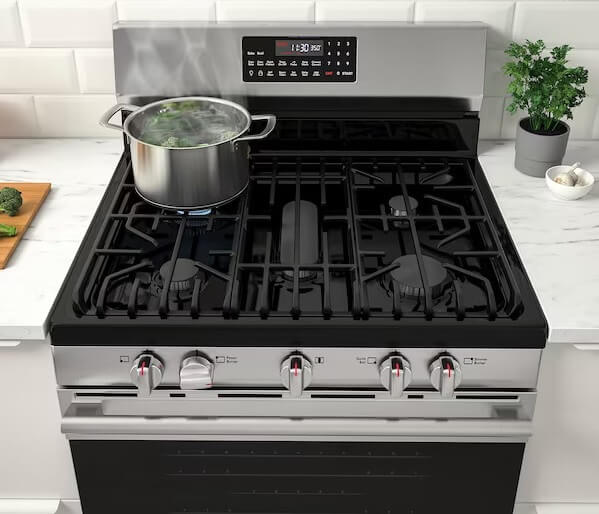Gas ranges have long been a staple in kitchens around the world, offering a reliable and efficient method of cooking. If you’re in the market for a new range, it’s important to understand the pros and cons of gas ranges.
In this comprehensive guide, we will delve into the advantages and disadvantages of these appliances, helping you make an informed decision for your culinary needs.
Table of Contents
Pros of Gas Ranges
Gas ranges come with numerous benefits that have made them a preferred choice among home chefs. Let’s explore some of the advantages they offer:
Precise Temperature Control
One of the significant advantages of gas ranges is their precise temperature control. Gas burners respond quickly to adjustments, allowing for instant heat changes during cooking. This level of control is particularly beneficial for delicate tasks such as simmering or sautéing, where precise temperature adjustments are crucial.
Even Heat Distribution
Gas ranges provide even heat distribution, which ensures consistent cooking results. The open flame of a gas burner distributes heat evenly across the cookware, reducing the risk of hot spots and unevenly cooked food. This makes gas ranges an excellent choice for achieving optimal cooking performance.
Versatility in Cooking Methods
Gas ranges offer versatility in cooking methods. With the option to adjust flame size and intensity, you can choose between high heat for searing and low heat for gentle simmering. Gas ranges also provide the ability to use different types of cookware, including cast iron and copper, which require direct heat contact for optimal performance.
Energy Efficiency
Gas ranges are generally considered more energy-efficient compared to electric ranges. Gas burners heat up and cool down quickly, minimizing energy wastage. Additionally, gas is often less expensive than electricity in many regions, making gas ranges a cost-effective choice for long-term use.
Cons of Gas Ranges
While gas ranges offer numerous advantages, it’s essential to consider their potential drawbacks as well. Let’s explore some of the cons associated with these appliances:
Higher Upfront Costs
Gas ranges tend to have higher upfront costs compared to their electric counterparts. This is primarily due to the complexity of gas line installation and the cost of the range itself. If your kitchen doesn’t have an existing gas line, it may require professional installation, adding to the overall expense.
Safety Concerns
Gas ranges present potential safety concerns due to the open flame. There is a risk of fire or gas leaks if the burners are left unattended or if the gas connections are not properly maintained. However, modern gas ranges come equipped with safety features such as automatic shut-off valves and flame sensors to mitigate these risks.
Maintenance and Cleaning
Cleaning and maintenance of gas ranges can be slightly more involved compared to electric ranges. The grates, burners, and other components may require regular cleaning to remove grease and food residue. Additionally, gas burners can accumulate carbon deposits over time, requiring occasional deep cleaning to ensure optimal performance.
Limited Aesthetic Options
Gas ranges may offer fewer aesthetic options compared to electric ranges. While electric ranges often come in a variety of sleek and modern designs, gas ranges can be more limited in terms of style and appearance. However, there are still options available in the market to suit different kitchen aesthetics and design preferences.
Pros and Cons of Gas Ranges
| Pros | Cons |
|---|---|
|
|
Conclusion: Making an Informed Decision
Gas ranges offer precise temperature control, even heat distribution, versatility in cooking methods, and energy efficiency. These advantages make gas ranges a popular choice among home chefs who value control and performance in their cooking appliances. However, it’s important to consider the potential downsides, including higher upfront costs, safety concerns, maintenance requirements, and limited aesthetic options.
When deciding whether a gas range is the right choice for your kitchen, consider your cooking style, budget, safety considerations, and overall kitchen design. If precise temperature control and versatility in cooking methods are important to you, a gas range may be an excellent option. However, if upfront costs, safety concerns, or maintenance requirements pose significant challenges, you may want to explore alternative options such as electric or induction ranges.
Research different gas range models, read customer reviews, and consult with professionals to make an informed decision that suits your specific needs. Remember to prioritize safety by ensuring proper installation and maintenance of your gas range.
By weighing the pros and cons of gas ranges, you can select a cooking appliance that enhances your culinary experience and meets your kitchen requirements. Enjoy the benefits of cooking with gas and create delicious meals with precision and control.

